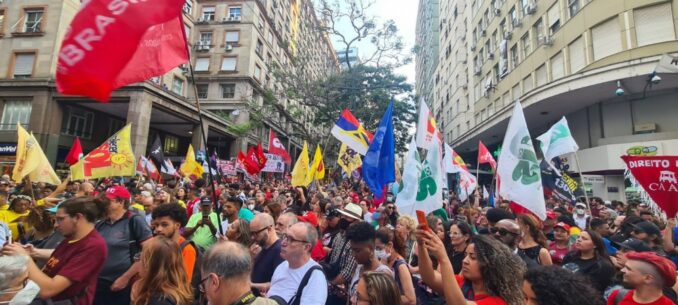Brazil’s Lula moves against Bolsonaro collaborators

Brazilian Workers Confederation condemns coup attempt. Jan. 10, Porto Alegre, Rio Grande do Sul. Credit: CTBRS
Brazilian ex-President Jair Bolsonaro’s forces attempted a coup Jan. 8 in Brasilia and failed — the failure put Brazil’s ultraright on the defensive. Their attack on the Legislature, the Presidential Palace and the Supreme Court shocked a large section of the population, arousing more anger than fear.
Before Lula’s Jan. 1 inauguration, demonstrations by Bolsonaro’s forces on the highways and near military barracks called on the generals to overthrow newly elected President Luis Ignácio “Lula” da Silva.
Like Donald Trump in the U.S. two years earlier, Bolsonaro claimed, without evidence, that the election was fraudulent. A Brazilian version of the Trump administration, Bolsonaro’s administration was noted for racism, misogyny and anti-LGBT+ rhetoric. He fled to Florida, where he has kept quiet about the failed coup attempt.
Within days of the Jan. 8 fighting, mass demonstrations and rallies supporting Lula and attacking the Bolsonarists erupted in 50 cities in all 27 Brazilian states.
According to the polling organization Datafolha Institute, 93% of Brazilians oppose the coup attempt, and 46% want the perpetrators punished. The perpetrators include both those who trashed the government buildings and the police, government and army officials who facilitated the attack.
Broad class struggle
The struggle is unfolding in Brazil on many levels. While most visible within the government institutions and among the electoral parties, it is a broad class struggle that runs deep. On one side are the workers and poor of Brazil, including many Afro-descendants and Indigenous peoples and their organizations.
On the other side are the 1% superrich and the media, banks, police and army that they control. On the international level, various openly reactionary organizations in North America and Europe also support Bolsonaro.
Brazil, with an area making up half the continent, borders 10 of the other 12 countries in South America. Its population of some 216 million people, of whom about 120 million are Afro-descendants, comprises about half that of the continent’s. First colonized by Portugal, Brazil’s settlers became independent in 1822, but the enslavement of Black and Indigenous people continued until 1888.
The struggle now unfolding in Brazil affects all of South America and impacts all the world.
Lula’s earlier administrations were known for attempts to gain more independence for Latin American and Caribbean countries from the U.S. — within limits. The Biden administration, for narrow reasons, might oppose Bolsonaro at this time. The interest of world imperialism, however, is to prevent Brazil from gaining real sovereignty and using its sovereignty to aid its neighbors.
Lula’s first administrations in the 2000s eliminated much dire poverty in the poorest regions of Brazil, ending much hunger and homelessness. Four years of Bolsonaro reestablished hunger, while allowing the 1% to grow even richer. Now Lula promises his government will end hunger. — And a sharpening of class struggle seems inevitable.
Workers Party (PT) leader Gleisi Hoffmann said on the day of the coup attempt that the Bolsonarist mob was neither “a mass movement, nor is it spontaneous. It is organized by bandits, who have very objective interests: illegal mining, land grabbing, weapons release, militias and other things, all blessed by Bolsonaro.” (TeleSUR English, Jan. 8) These elements will stop at nothing to protect their profits.
Lula purges police and army
In the first days after the assault in Brasilia, some 1,500 rightist participants were arrested. About 600 were released after a few days. It was obvious from videos of the assault on the government that sectors of the police, army and local government, including some of the top officials, allowed the attack on the government, and these sectors took no steps to remove those occupying the buildings.
In an attempt to purge the state apparatus of Bolsonaro collaborators, Lula has fired 26 of the 27 commanders of the Highway Patrol. These officers had allowed Bolsonaro supporters to occupy and block highways in the weeks following the national election. In addition, Lula fired 18 other police commanders.
Lula fired 40 top commanders of the armed forces on Jan. 17 and another 13 on Jan. 20. The Brazilian president said that none of the military’s intelligence forces had warned him of the impending Jan. 8 coup attempt.
Lula has also replaced the Army Commander, General Júlio Cesar de Arruda, on Jan. 21, with General Tomás Miguel Ribeiro Paiva, who had led the army during the presidency of Dilma Rousseff of the Workers Party. In 2016, the Brazilian Congress impeached Rousseff.
The Bolsonaro elements who infest the local legislatures and the repressive apparatus in many Brazilian states and the federal government have been pushed back for the moment. But they remain a threat.
Whichever administration runs the White House, Washington can be expected to pressure the Brazilian government to restrict its opposition to U.S. interests. U.S. agencies will use their connections with the Brazilian military and bureaucracy — with or without Bolsonaro — to enforce this policy, just as they did during President Barack Obama’s administration.
It will take the continued mobilization of the mass movement in Brazil, and its cohesion and organization, to keep the Bolsonarists out and to make gains for the masses of the people, along with the solidarity of workers’ movements worldwide.

